Kali Ma is both the auspicious Ambika and the terrible Kali. Kali is the relentless power of time, which in the end consumes everything. Kali represents the energy of the universe. She is Shakti. Continue reading
Tag Archives: rajas
155 – How we should prepare our mind
We must learn and understand the practice of Karma Yoga and Bhakti Yoga. What is Karma Yoga? The word karma is used freely and frankly and all our misfortunes are blamed on our bad Karma. Karma is the real desires created in the mind. When we wish to possess, it is karma. Karma is a movement that takes place within the mind, body or emotions. Continue reading
059 – Why is the Goddess called Mahamaya
Shakti existed before the creation of time and space. Shakti is also called the pristine matter or Prakriti (nature). Prakriti expresses herself in three different forms as the power of the universe. These three qualities are called Gunas. The Mother now creates the universe based on the Gunas. The Gunas are sattwa, rajas and tamas. Continue reading
014 – Gunas the power of the universe
 How can we commune with the powers of the universe. We live in a cosmos which is permeated by powerful sources.There are deities everywhere, whether they are in the clouds, forests, waterfalls, mountains, planets, sand or an atom. We have to connect our heart with them and we will feel their presence. We are part of the divinities as these are aspects of our deeper self. We are comprised of three gunas, Tamas, Rajas and Sattwa. They are our basic energies and their complex interactions create the physical universe. Continue reading
How can we commune with the powers of the universe. We live in a cosmos which is permeated by powerful sources.There are deities everywhere, whether they are in the clouds, forests, waterfalls, mountains, planets, sand or an atom. We have to connect our heart with them and we will feel their presence. We are part of the divinities as these are aspects of our deeper self. We are comprised of three gunas, Tamas, Rajas and Sattwa. They are our basic energies and their complex interactions create the physical universe. Continue reading
Gunas, devotion and values – James Swartz – Yoga of Love, Bhakti Yoga, Bhakti Sutra, Narada
How to overcome tamas? When you are rajasic and succesful you
When you are rajasic and succesful you
have no time to pay attention to yourself. Stuck in sattva. Danger
of vanity and stop of growth. Verse 58: “Success is easier to attain
by informal devotion than by any other means.” If you bring
discipline into your life you do things that are good for you and
your self esteem grows. Verse 59: “Devotion is easiest because it
does not depend on any other authority; it is self-validating.” In
Vedanta you have to live according to the scripture. Verse 60:
“Furthermore, devotion is the embodiment of peace and supreme
joy.” Verse 61: “Once all worldly and spiritual duties are consigned
to God, the devotee need not worry about gain and loss.” Ishvara
takes care of your worldly affairs. Do the best every day and then
see what happens. Manusha the one who thinks and worry. Verse
62: “To attain non-dual devotion, do not abandon responsibilities
in this world, but surrender the results of all actions to the
Lord.”Expression of Karma Yoga. When you give the actions to the
Lord then your worry stops. Karma Yoga and gratitude. Gratitude
as a sadhana. Honesty and purity. Verses 63, 64: “Don’t chase
money or entertain yourself with sex. Don’t compromise your
values and don’t quarrel with others. Relinquish false pride,
hypocrisy and other vices.” Fearless moral inventory is necessary.
12 step program. Sorting out spiritual and material values. Fully
assimilate the good values, renounce the bad values. In the
Bhagavad Gita the values are called knowledge.
More: Vedanta Seminars.
More on: Vedanta.
Learn more about: Yoga Vidya.
You can sign up for: our online seminars.
You can also support us by: donating.
Podcast: Play in new window | Download
Subscribe: RSS
Reincarnation, non-dual love and gunas – James Swartz – Yoga of Love, Vedanta, Bhakti Sutra Narada
Free will. Making no choice and turning it over to ishvara.
Issue of free will: what values are determining your use of
free will? Those values are chosen by the gunas. If tamas
predominates fear will inform your choices. If rajas
predominates desire will inform your choices. The self has
no values. It is value-neutral. Reincarnation view: this
person will transmigrate and will be the same person in the
next incarnation. The person‘s karma is coming along with
them. But: when the body goes this person is never coming
back. The only thing that transcends time are the subtle and
the causal body. The circumstances of the next birth will be
different. You will have a new identity. The person that you
think you are is a conceptual person, no actual person. You
claim that subjective and objective events equal ‚I‘.
Transmigration: What reincarnates is the subtle body
powered by the vasanas. Your parents will be selected by
ishvara according to your vasanas. Non-eternal jiva. Eternal
jiva is consciousness. It is the same ‚I‘ for everyone and it is
eternal. Irrelevance of the personal story and the
experiences of the person when you know your nature. ISense
is an image or a reflection of the I. The reflection is
not the Self. Vedanta is a complete teaching. Since we are
multi faceted people we need to understand the self from
different angles. 360 ° knowledge of the self and the world.
Verse 51: „The essential nature of pure love of God is
beyond description.“ But you can know it. Verse 52: “Trying
to describe the experience of pure love of God is like a
mute trying to describe a particular taste.” Verse 53:
„Occasionally, pure love of God is revealed in a qualified
person.” In great souls you find this kind of love that is
totally different from worldly love. Verse 54: “Pure love of
God is devoid of material qualities and desires, manifests
more and more every moment, is uninterrupted and is
always experienced as one’s innermost consciousness.”
Verse 55 “Having discovered non-dual love, you see only
the self everywhere, hear the self in every word, speak only
of the self and think only of the self.” You can discover love
but you can‘t make it happen. You get rid of your concepts
and discover that you are love. The gunas influence the way
you experience love. Then it is love conditioned by the
gunas. Verse 56 “Secondary devotional service is of three
kinds, according to which of the gunas predominates at any
time or according to the motivation – distress, desire or
knowledge – that brings one to devotion.” Verse 57: “Each
succeeding type of devotee is superior to the preceding
type.” Rajasic devotees are superior to tamasic devotees,
sattvic devotees are superior to rajasic devotees and nondual
devotees are superior to sattvic devotees. You need
rajas to get out of tamas. Tamas means you live in a fantasy
world. In rajas you are driven by ambition. You need sattva
and knowledge to get out of rajas. Self inquiry renders the
gunas non binding, so you can overcome attachment to
sattva.
Podcast: Play in new window | Download
Subscribe: RSS
Intuition of Reality – Vedanta Talk 10 by Ira Schepetin
 Story about Swami Satchidanandendra and Kirtan. The concept of avidyā / ignorance. Best source is adhyāsa bhāṣya: Introduction to the commentary of Shankaracharya
Story about Swami Satchidanandendra and Kirtan. The concept of avidyā / ignorance. Best source is adhyāsa bhāṣya: Introduction to the commentary of Shankaracharya
on the Brahma Sutras. 2 notions of ignorance: Shankaracharyas notion of mithyā jñāna and Padmapādas notion of mithyā ajñāna. Avidyā and māyā. Waking ego, dream ego and the witness. Vedānta is no dogma. Ego is kṣetra. Every quality is an object to the witness. Sadhana: act to get rid of tamas. Do your duty with no desire for the fruit of your action to overcome rajas. Sadhana to become free from actions (naiṣkarmya): no attachment to saṅkalpa, karma, karma phala. Freedom from the gunas. Jñānaniṣṭha. Jñāni. Bhagavad Gītā ch. 18, 66.
More Vedanta Seminars you will find here.
More on Vedanta you will find here.
English Community, Blog, Seminars you will find here.
Podcast: Play in new window | Download
Subscribe: RSS




